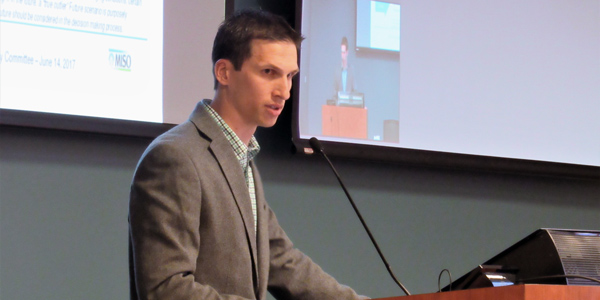By Amanda Durish Cook
MISO will pursue changes to its Transmission Expansion Plan futures weighting process in the 2019 cycle of projects, delaying the initiative by one year.
Starting with MTEP 19, equal weighting will be assigned to all four future grid and generation scenarios, effectively eliminating weighting of the 15-year futures. Staff initially said it would drop weighting beginning with MTEP 18. (See MISO Rethinks Weighting of MTEP 18 Futures.)
The RTO began reviewing its weighting process early this year after MISO South transmission owners and regulators of southern states asked for less emphasis in one MTEP 17 study on futures containing policy regulations and increased penetration of alternative technologies. The RTO granted the request. (See MISO Changes MTEP Futures Weighting for South.)
MISO policy studies engineer Matt Ellis said the RTO is delaying the change because MTEP 18 futures were developed with the understanding that stakeholders would be involved in deciding their importance.
“It doesn’t make sense to change something when it was implicitly understood at the beginning,” Ellis said during an Aug. 16 Planning Advisory Committee meeting. He asked for stakeholder input on the unfinished MTEP 18 weighting process and said MISO still reserves the right to “put its thumb on the scale” if it thinks the stakeholder rationale for weighting is weak. Not surprisingly, MISO is recommending a 25% weighting for all four MTEP futures: a “limited,” “continued” and “accelerated” fleet change and an emerging technologies scenario.
MISO is also considering using benefit-cost criteria in all four futures in MTEP 18 to determine which transmission projects are sent for Board of Directors approval. Projects may have to have an average 1.25:1 benefit-cost ratio across the four MTEP futures and earn at least a 1:1 cost-benefit ratio in at least two. Projects may also be rejected if a project earns a negative benefit of 0.8 greater in any one future.
Ellis said MISO will take a backward look at previously approved MTEP projects to further refine benefit-cost criteria and asked for stakeholder input on establishing benefit-cost floors.
The new equal-footing weighting process in 2019 will make MTEP futures more predictable year to year and shift the focus from stakeholders’ perceived likelihood of a certain future to how effectively a project can perform under varying scenarios, Ellis said.
“What we can all agree on is the old process wasn’t very predictable. The MISO process should be very predictable, very cut and dried,” he said.
Bill Booth of the Mississippi Public Service Commission asked if MISO was firm in its decision that all futures will have equal importance. “Seems to me that by eliminating weighting, you’re eliminating stakeholder feedback,” Booth said.
“We are firm on that. We are firm on even and equal weighting,” Ellis said.
The PSC’s David Carr asked if MISO viewed the Trump administration’s rollback of environmental regulations — which sparked the requests for reweighting of MTEP 17 futures — as an “anomaly” that is not likely to occur again.
“We can tell you in the previous three [MTEP] cycles, we’ve gotten requests to reweight. So this is an issue that’s been building for quite some time,” Ellis said.
Going forward, Ellis said, MISO would only consider revising weights when all stakeholder sectors ask it to rethink the likelihood of a certain future. He also said that development of futures themselves will remain unchanged.
“As we go through the futures development process, we gather extensive stakeholder feedback. … We can tell you that all of our futures are very reasonable,” Ellis said.
“Sectors aren’t providing weights based on their expectations of the future, but on their advocacy of a particular business model,” said Wisconsin Public Service’s Chris Plante.
“That’s a great point,” replied Ellis.
Customized Energy Solutions’ David Sapper said it was important to have MISO’s “independent, unbiased” voice in the futures weighting process.






